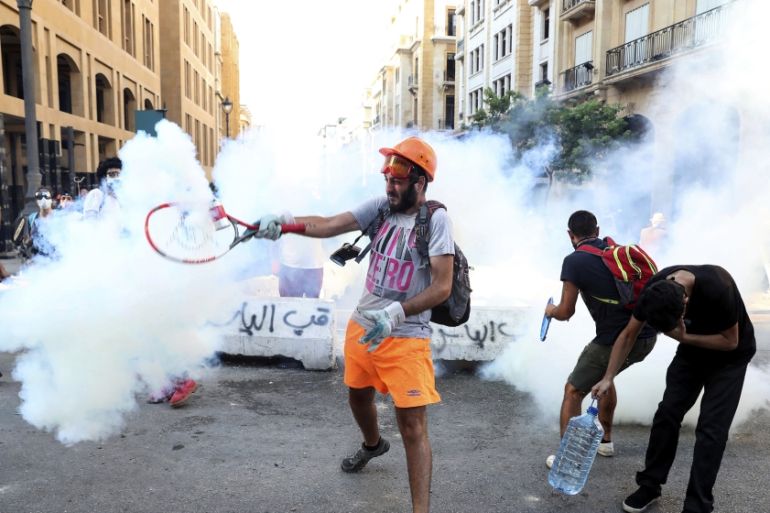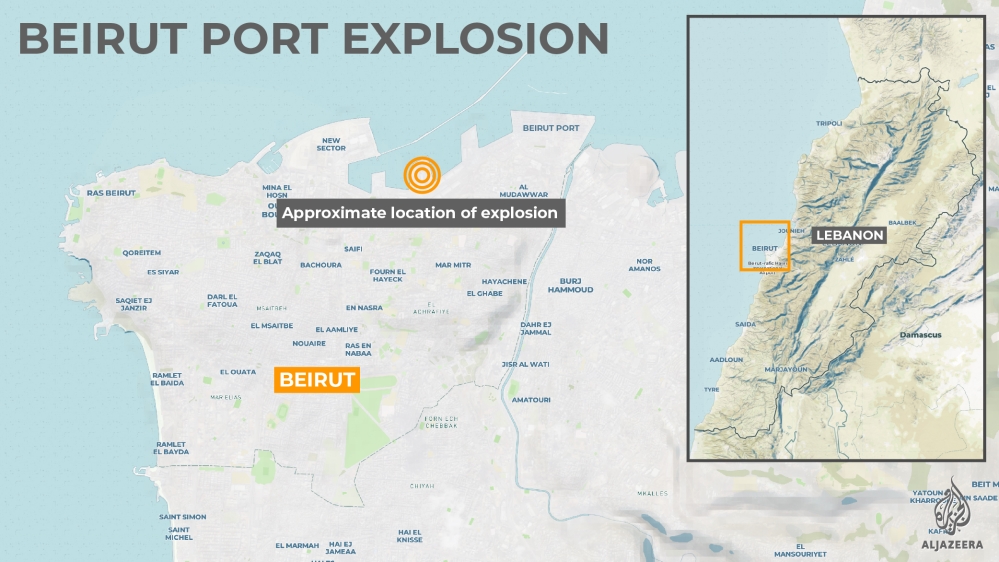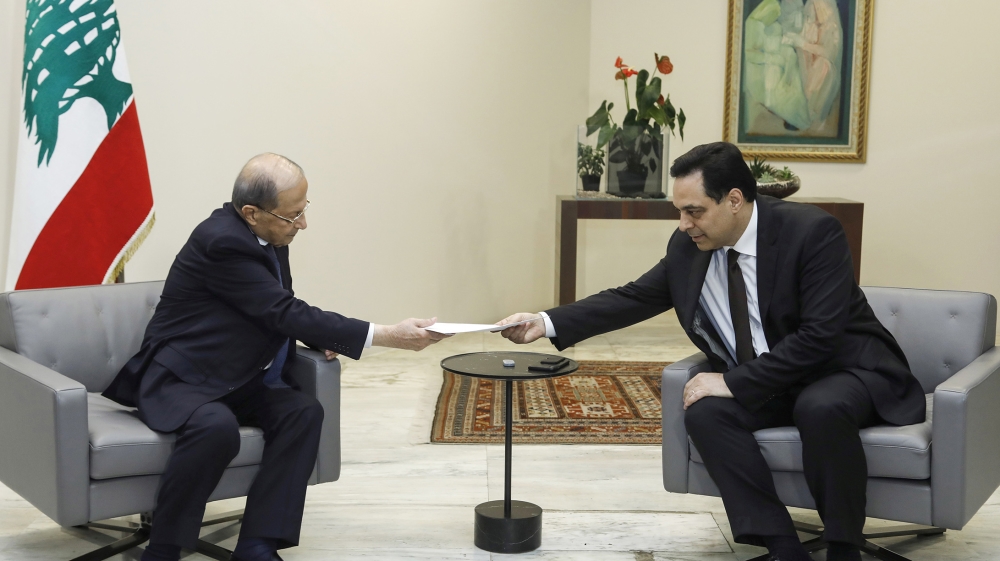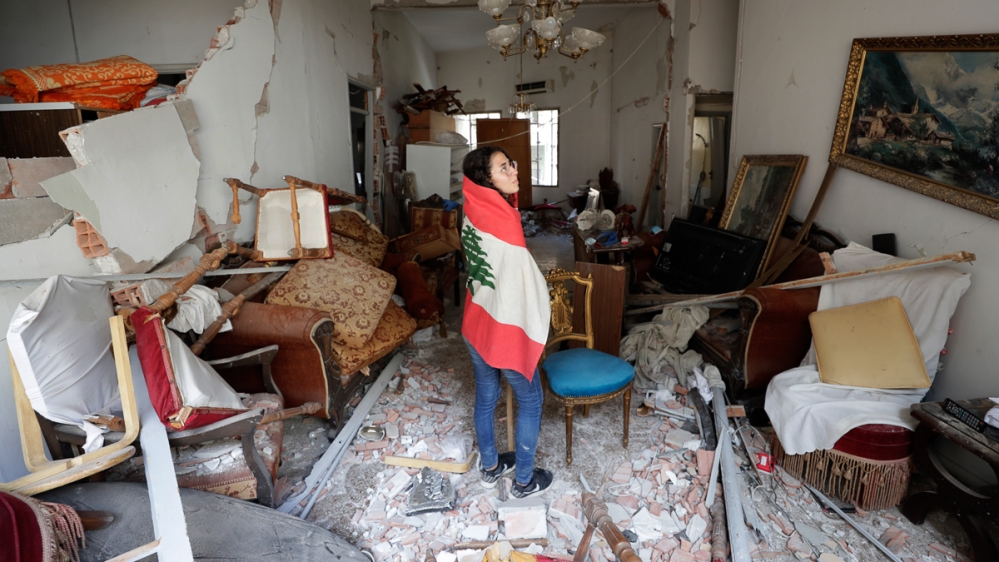Endemic corruption caused Beirut blast, says Diab: Live updates
PM Hassan Diab announces resignation of his government, says ‘the ‘system of corruption is bigger than the state’.

-
Lebanese Prime Minister Hassan Diab has announced his resignation almost a week after the massive explosion that devastated the capital, Beirut, killing some 200 people and wounding 6,000 others.
-
Lebanon’s Justice Minister Marie Claude Najm, Information Minister Manal Abdel Samad, and Environment Minister Damianos Kattar have all resigned from their posts.
-
Lebanese police fired tear gas to try to disperse rock-throwing protesters blocking a road near Parliament in Beirut on Sunday in a second day of anti-government demonstrations triggered by last week’s devastating explosion.
-
International leaders joined a virtual donor conference led by France and the UN in the aftermath of the devastating explosion, pledging nearly $300m in humanitarian assistance that will be “directly delivered to the Lebanese population”.
- US President Donald Trump has announced that the US will give “substantial” aid to Lebanon, but did not specify how much.
-
The IMF said it is willing to redouble efforts to help Lebanon after the devastating explosion, but said all of the country’s institutions needed to show willingness to carry out reforms.

Here are the latest updates:
Monday, August 10
19:30 GMT – France urges ‘rapid formation’ of new Lebanese government
France has called for the “rapid formation” of a new government in Lebanon shortly after premier Hassan Diab stepped down over the deadly Beirut port blast.
Keep reading
list of 4 itemsParallel seasons: How Lebanon hides from reality
Lebanon’s FIBA World Cup journey is about much more than basketball
Justice for the Beirut blast can help avert Lebanon’s collapse
“The aspirations expressed by the Lebanese in terms of reforms and governance must be heard,” French Foreign Minister Jean-Yves Le Drian said in a statement.
“The priority must be the rapid formation of a government that can live up to the expectations of the people, whose mission will be to meet the main challenges of the country, especially the reconstruction of Beirut and reforms without which the country will plunge into economic, social and political chaos,” he said.
|
|
18:20 GMT – UN food chief: Beirut could run out of bread in two weeks
The head of the UN food agency said he’s “very, very concerned” Lebanon could run out of bread in about 2 and a half weeks because 85 percent of the country’s grain comes through Beirut’s devastated port – but he believes an area of the port can be made operational this month.
David Beasley, who is in Beirut assessing damage and recovery prospects, told a virtual UN briefing on the humanitarian situation following last week’s explosion in the Lebanese capital that “at the devastated site, we found a footprint that we can operate on a temporary basis.”
“Working with the Lebanese army, we believe that we can clear part of that site,” Beasley said. “We’ll be airlifting in a lot of equipment, doing everything we can.”
Beasley said he had met with Cabinet ministers – who all resigned later Monday – and told them the UN needs “absolute cooperation now, no obstacles” because people on the streets are angry and said they need international help but “please make certain that the aid comes directly to the people.”
17:50 GMT – Investigation: Excessive force used against Beirut protesters
Enraged over a massive blast in Beirut last week, tens of thousands of protesters took to the streets of the capital on Saturday to call for accountability and the downfall of the country’s ruling class.
A large number of protesters threw stones and other projectiles. They faced tear gas, rubber bullets, and birdshot fired from shotguns.
Through analysis of videos and images of the security response by the army and men in plain-clothes on the day, and examination of medical documents and interviews with doctors who treated the wounded, Al Jazeera established that security forces violated international standards on the use of force.
Read more here.
17:40 GMT – Lebanon’s Aoun accepts gov’t resignation, asks Diab to stay on in caretaker capacity
Lebanese President Michel Aoun has accepted the resignation of the prime minister’s government, following last week’s devastating explosion in Beirut port and asked it to stay on in a caretaker capacity until a new cabinet is formed, a televised announcement said.

16:45 GMT – Lebanon PM Hassan Diab resigns amid anger over Beirut blast
Lebanese Prime Minister Hassan Diab has announced his resignation almost a week after a massive explosion that devastated the capital, Beirut, killing some 200 people and wounding 6,000 others.
Diab made the announcement in a televised address to the nation on Monday.
He said that “this crime” was a result of endemic corruption and called for the trying those responsible for the deadly blast.
Read more here.
14:35 GMT – Lebanon’s gov’t under pressure to resign after Beirut explosion
Lebanon’s government is almost certain to step down after four ministers quit and at least three more promised to do so if Prime Minister Hassan Diab did not announce the resignation of the cabinet himself.
Tensions have been boiling over in the country following a massive explosion that on Tuesday tore through the capital, Beirut, killing some 200 people and wounding 6,000 others.
Justice Minister Marie Claude Najem was the latest minister to announce her resignation Monday, while Finance Minister Ghazi Wazni arrived to a cabinet session with his resignation letter but held on to it until after the session.
Read more here.
13:50 GMT – Lebanon PM to announce gov’t resignation soon: Minister
Lebanon’s Prime Minister Hassan Diab will soon announce his government’s resignation, the health minister was quoted as saying by Reuters news agency.
Diab was set to deliver an address to the nation at 7:30 pm local time, his office said.
13:20 GMT – Lebanon’s finance minister resigns
Lebanon’s Finance Minister Ghazi Wazni, a key negotiator with the IMF over a rescue plan to help Lebanon exit a deep financial crisis, has resigned over last week’s devastating Beirut port blast, local media reported.
11:50 GMT – Egypt moves ‘dangerous materials’ from airports after Beirut blast
Egypt’s civil aviation ministry said that after Lebanon’s massive explosion last week it was moving “dangerous materials” held at airports nationwide to more secure locations.
The ministry is “taking precautionary measures with regards to dangerous materials, either immediately releasing them or transferring them to safe storage spaces well outside the range of airports and residential areas,” it said in a statement.
The statement referred to materials held in “cargo bays and storage warehouses in Cairo’s airport and all airports nationwide”, without specifying which kind of materials would be moved.
11:05 GMT – Death toll from Beirut explosion rises to 200
More than 200 people are believed to have been killed by Tuesday’s devastating explosion, Beirut’s governor has said.
Marwan Abboud said dozens were still missing, many of them foreign workers.
10:45 GMT – Lebanon’s security chief questioned by judge
A Lebanese judge has began questioning the heads of the country’s security agencies over last week’s devastating blast in Beirut.
Judge Ghassan El Khoury began questioning Major General Tony Saliba, the head of state security, according to state-run National News Agency. It gave no further details, but other generals are scheduled to be questioned.
About 20 people have been detained over the blast, including the head of Lebanon’s customs department and his predecessor, as well as the head of the port. Dozens of people have been questioned, including two former cabinet ministers, according to government officials.
10:00 GMT – Lebanon’s cabinet under pressure as ministers quit
Lebanese protesters have called for a rally outside Baabda palace to demand President Michel Aoun to step down after resignations by several ministers, with the justice minister the latest to go.
A cabinet meeting is scheduled for today amid reports that the whole government might resign. If a total of seven ministers resign, the cabinet would effectively become a caretaker government.
Some Lebanese doubt change is possible in a country where sectarian politicians have dominated the country since the 1975-90 civil war.
“It won’t work, it’s just the same people. It’s a mafia,” said Antoinette Baaklini, an employee of an electricity company that was demolished in the blast.
09:25 GMT – Lebanon justice minister resigns
Lebanese Justice Minister Marie Claude Najm said in a statement she had presented her resignation from the government, citing the catastrophic explosion at the port of Beirut.
Najm said she was resigning “out of my conviction that staying in power in these conditions, without fundamental change to the system, will not lead to the reform which we worked to achieve”.
She called on the rest of the government to resign, and said she had also pressed for early elections due to the scale of Lebanon’s crisis.
Third minister resigns Justice Minister Marie Claude Najm #Lebanon
— Zeina Khodr (@ZeinakhodrAljaz) August 10, 2020
07:45 GMT- In Pictures: Damaged homes, shattered dreams in Beirut

Tuesday’s massive explosion in Beirut tore through thousands of homes, blowing off doors and windows, toppling cupboards, and sending books, shelves, lamps and everything else flying.
Within seconds, more than a quarter of a million of the Lebanese capital’s residents were left with homes unfit to live in.
There are estimates that say 6,200 buildings were damaged.
See more pictures here.
06:40 GMT – Iran says Beirut blast should not be politicised
Iran said countries should refrain from politicising the massive blast in Beirut last week, adding that the United States should lift sanctions against Lebanon.
“The blast should not be used as an excuse for political aims … the cause of the blast should be investigated carefully,” Foreign Ministry spokesman Abbas Mousavi told a televised news conference.
“If America is honest about its assistance offer to Lebanon, they should lift sanctions.”
06:10 GMT – Blast destroyed landmark 19th century palace in Beirut
The Sursock palace, built in 1860 in the heart of historical Beirut on a hill overlooking the now-obliterated port, is home to beautiful works of arts, Ottoman-era furniture, marble and paintings from Italy – collected by three long-lasting generations of the Sursock family.
The house in Beirut’s Christian quarter of Achrafieh is listed as a cultural heritage site, but Roderick Sursock – owner of Beirut’s landmark Sursock Palace – said only the army has come to assess the damage in the neighborhood. So far, he’s had no luck reaching the Culture Ministry.
“In a split second, everything was destroyed again,” says Sursock.
Hello, this is Linah Alsaafin taking over the blog from my colleague Ted Regencia.
04:20 GMT – Nine Lebanese MPs, two ministers resign from government
Nine members of parliament and two ministers have so far resigned from their position in Lebanon, according to an Al Jazeera tally.
Manal Abdel Samad, the information minister, and Damianos Kattar, the environment minister, resigned their posts on Sunday as the government comes under heavy pressure following the explosion on Tuesday.
So far, 9 MPs & 2 ministers resigned since #Beirut blasts, #Lebanon
MPs:
Marwan Hamadeh
Paula Yaacoubian
Nadim Gemayel
Samy Gemayel
Elias Hankash
Neemat Ephrem
Michel Moawad
Dima Jamali
Henry HelouMinisters:
Manal Abdel Samad, information
Damianos Kattar, Environment— Saad Abedine (@SaadAbedine) August 9, 2020
04:04 GMT – Explosion created 43-metre deep crater
The huge explosions that killed 158 people in Lebanon’s capital Beirut last Tuesday left a 43-meter deep crater at the site, according to local reports. The huge crater lies near a granary destroyed in the blast, filled with seawater.
The explosions at Beirut’s port also injured more than 6,000 people and devastated nearly half the buildings in the city.
02:15 GMT – Trump promises ‘substantial’ aid to Lebanon
US President Donald Trump has pledged that his administration will give “substantial” aid to Lebanon, but did not provide details.
“On a humanitarian basis, we have to do it. We have to do it. It’s, you know, you can almost say how does a country survive such a tragedy? This was at a level that people over there, they said, is at a level that we’ve never seen before.”
An emergency donor conference on Sunday raised pledges worth nearly 253 million euros ($298 million) for immediate humanitarian relief.
02:05 GMT – Beirut governor says many bodies still unidentified
Beirut Governor Marwan Abboud has said several foreign workers and truck drivers remain missing following the explosion and are assumed to be dead.
In an interview with Al Jadeed TV station, Abboud added that many of the fatalities are still unidentified, and that it could take time to complete the identification of the remains.
According to reports, an estimated 45 of the people killed in the blast were Syrian nationals, working in the service sector in the country.
Sunday, August 9
20:37 GMT – IMF chief renews call for reforms
Kristalina Georgieva, the head of the International Monetary Fund, warned Lebanon again it would not get any loans from the institution unless it reformed its government.
“Current and future generations of Lebanese must not be saddled with more debts than they can ever repay,” she said during the pledging conference.
That is why, she said, the IMF requires “debt sustainability as a condition for lending”, adding that “the financial system must be solvent,” too.
19:32 GMT – Environment minister steps down
Environment Minister Damianos Kattar said in a statement that he was stepping down, becoming the second minister to quit over the explosion.
“In light of the enormous catastrophe … I have decided to hand in my resignation from government,” Kattar said, adding he had lost hope in a “sterile regime that botched several opportunities”.
19:21 GMT – Will explosion cause a humanitarian disaster?
Lebanon was in a dire state even before the enormous explosion which wrecked much of Beirut.
The government is bankrupt, the currency is almost worthless, and millions of Lebanese are jobless. The explosion made things worse by destroying the main port for a nation heavily reliant on food imports.
Some 300,000 people made homeless in Beirut have received little help from the government. Lebanon is also home to 1.5 million Syrian refugees. How will aid organisations deal with the challenge?
Find out more here or watch Inside Story below.
18:14 GM – Aid summit raises $300m to be given ‘directly’ to people
A host of nations have pledged nearly $300m in humanitarian assistance to Lebanon at a conference aimed at rallying international support for the crisis-hit country.
The sums will be routed through the UN, international organisations and NGOs, rather than the Lebanese government – in line with the demands of large swaths of the Lebanese public who fear the funds would be lost to corruption.
Read more here.

16:07 GMT – Demonstrators hurl stones at police in second day of protests
Protesters hurled rocks at security forces blocking a road near Lebanon’s parliament in a second day of protests against the government.
Reuters News Agency reported that hundreds were converging on a main square where thousands of Lebanese protested on Saturday against a political elite they blame for the country’s economic and political woes.
On Saturday, more than 700 protesters were wounded in clashes with riot police who used tear gas and live bullets in a bid to disperse crowds.